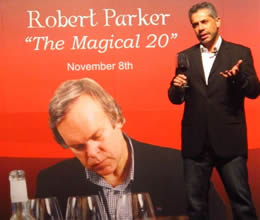 Conducted a survey with Gary Pickering, a wine researcher at Brock University in Ontario, on winemakers and critics who volunteered at several wine events in Canada, Prof John Hayes, Assistant Professor of Food and Science and Director of Pennsylvania State University's sensory evaluation centre found that the fundamental tasting ability of an expert is superior but different. The findings imply that apparently eccentric descriptions like a wine having the taste of pear drops, liquorice or even rubber may not be wrong but ordinary people cannot identify them. Conducted a survey with Gary Pickering, a wine researcher at Brock University in Ontario, on winemakers and critics who volunteered at several wine events in Canada, Prof John Hayes, Assistant Professor of Food and Science and Director of Pennsylvania State University's sensory evaluation centre found that the fundamental tasting ability of an expert is superior but different. The findings imply that apparently eccentric descriptions like a wine having the taste of pear drops, liquorice or even rubber may not be wrong but ordinary people cannot identify them.
“If an expert's ability to taste is different from the rest of us, should we be listening to their recommendations?’ wonders Prof. Hayes.
Flavour tests found 110 wine experts to be more sensitive to tastes than 220 average consumers. Participants sampled an odourless chemical that is used to measure a person’s reaction to bitter tastes. People with normal tasting abilities tend to the find the chemical either tasteless or slightly bitter but wine experts, endowed with a more acute palate, were significantly more likely to find it extremely bitter than non-experts, according to the findings published in the current issue of American Journal of Enology and Viticulture.
Prior to the taste test, the researchers gave out a short questionnaire to determine the involvement in the wine industry of 330 participants at wine-tasting events in Ontario. Based on the answers to the questionnaire, they divided the people into two groups: wine consumers and wine experts. 110 participants indicated that they were professional winemakers, wine writers, liquor control agents, and wine judges; they were classified as wine experts. All the other participants were classified as non-experts.
Experts taste wine in such a different way that the 100-point quality scale used by critics like Robert parker, incorporating characteristics such as tartness, sweetness and fruitiness may be pointless for the ordinary average consumers, said Hayes. For instance specific descriptions of wines, such as having grapefruit or grassy notes with asparagus in the back layer, balance of sugar and acid or the tannins being ripe, silky or velvety may also be too subtle for most drinkers.
Previous studies have shown that the biological factors may explain the acute taste of experts. In fact, many may be attracted to careers in the wine industry as tasters, based on their enhanced ability to taste. While learning also plays a role and other factors like how they communicate their opinion on wines may be important but some may have an inherent advantage in learning to discern small differences in wine, say the researchers. Prof. Hayes says, “It is not just learning. Experts also appear to differ at a biological level.”
Because consumers may not have the same tasting ability, they probably don’t benefit as much from drinking highly rated wine, Hayes said. However, there may be psychological advantages of such reviews. “If you think the wine is supposed to be good, you’re going to enjoy it a lot.”
With infinite number of wineries and varieties in several wine regions and countries to select from, consumers like to depend on the opinion of experts and their rating reviews to help them make wine purchase decisions. Comments about flavours and aromas may be irrelevant to the average consumer but people still like help in identifying the best wines for their palate, Hayes said. “Just like people can be colour- blind, they can also be taste- blind. Statistically, the two groups were very different in how they tasted,” he adds.
The researchers also found that people who were more adventurous in trying new foods were also more willing to drink new types of wines and alcoholic beverages, but this did not necessarily predict their wine expertise. While wine experts were more likely to try new wines and alcoholic beverages, they were not more likely to try new foods, according to the report in Telegraph.
For the original study, click here
Our general advice to the novices is simple- drink what you like the best. But give wine a chance and try to taste as many as possible. A wine is really good and delicious if the finishing glass beckons another glass and if the end of a bottle makes you feel like opening another similar bottle to continue with the conversation and the good time-editor |